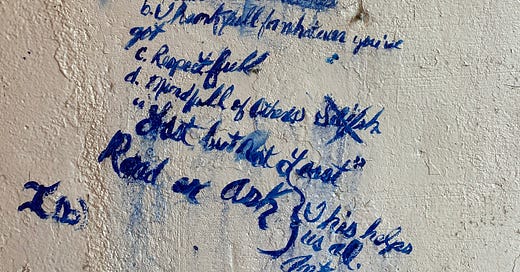It occurs to me, as I walk away from the hospital at 11 p.m., scolded by the security guard for badgering him to let our homeless friend into his warming center rather than trying to get her more substantive help, that Jesus was also a nomad in cities and towns. No one told Jesus to sign up for a voucher with DFSS or to “get a job” or “join the system” and do whatever dutiful obedience is necessary in order to deserve shelter. Or perhaps they did. But the community of Apostles and disciples he drew around him sometimes has the ring not just of evangelical fervor but of necessity. How long can a stray Galilean survive without hospitality?
It is our friends on the street who most resemble Christ. Who live, like St. Francis, in the most literal imitation of him. Christ didn’t really do much, you know, in order to earn his daily bread. He lured fishermen away from honest work and persuaded an agent of the state to leave taxes uncollected. What did they do in the meantime? Mostly just talk. And beg.
I think of one of our friends, who has a solution to everything, and who offers those answers (wanted or unwanted) to those in need, out of an abundance of compassion and a flagrant disregard for tact. Who's to say he’s not the closest resemblance to Christ in twenty-first century Chicago?
I think of another, who pesters me to buy him the rubber cement I promised him—annoying me to distraction, much like the widow and the unjust judge. He is organizing a small society of tent-dwellers, and feels a sense of responsibility for those living under hedges rather than the safety of nylon flaps. He offers new tented homes to those he sees some seeds of common fellow-feeling in. He cares about each person he meets, he buys pizzas with his small earnings from Door Dash or Uber Eats to share with us for lunch or dinner, and spent a whole weekend fixing a friend’s bike. He goes to daily Mass just like your grandmother or you. He doesn’t own a house but he is a member of the Body of Christ with us—baptized into his death and resurrection, receiving communion, and making the liturgy with us.
None of us are perfect but the heavenly Father. But are we sure there are no real, tangible incarnations of the Son of God here on earth? Isn’t he supposed to be with us where two or three are present in his name? Do we not know him, see him, eat him in the breaking of the bread? Am I wrong, then, to assume that God is near me in the friends who have nowhere to rest their heads, just like the Son of Man?
I find myself so often unable to solve their problems. To get them medication, housing, all these problems that have become bigger than human scale. It seems to me the call of the Gospel, the call we hear in the readings today, is to return to human scale. We are not asked to be successful, to slot each person into the designated space for them, to let the conveyor belt take them into their allotted social space.
I think of the Holy Fool—the tradition of Simeon, the Holy Fool and Patron saint of fools—of making oneself an outcast in the middle of a community for the sake of following Christ, for the sake of being a prophet in the midst of blindness. The holy fool—as depicted often in Russian literature—is the simpleton, the most like a child, who is the most wise.
Reading the directives of Matthew 25, it seems like Christ is giving his disciples—us—the roadmap to salvation: hospitality to fools. Not fixing the fool’s problems, or helping them, although both are noble and necessary work we should do as often as we can and as far as our powers extend. But salvation is not about that. It is about a pilgrimage together. Really, salvation is allowing oneself to get pulled into the foolishness of God by extending love and welcome over and over again to one who has worn it out. Each person, no matter who, are owed shelter, food, water, clothing. Perhaps there is no society possible—or perhaps it is a society that would cease to be good, a society we would not want—that would not include some holy fools wandering about, who depended upon their neighbors for what they need.
Opening our homes to the homeless is, we see (Luke 8:1-3), a foundational tradition in Christian discipleship, one that brings God so intimately near us. In opening my heart to the people who live on the precarity of the kindness of strangers and neighbors, I have seen so clearly the face of God.
Jesus replied, “Foxes have dens and birds have nests, but the Son of Man has no place to lay his head.” (Matthew 8:20)





